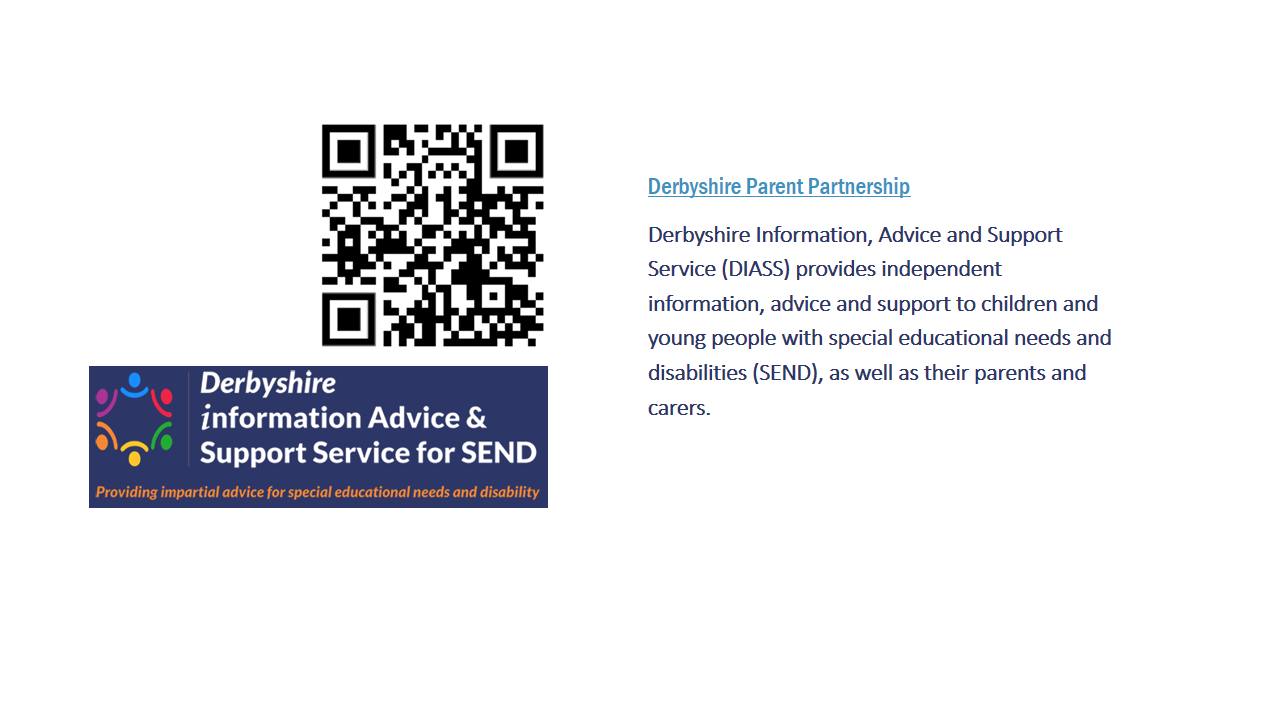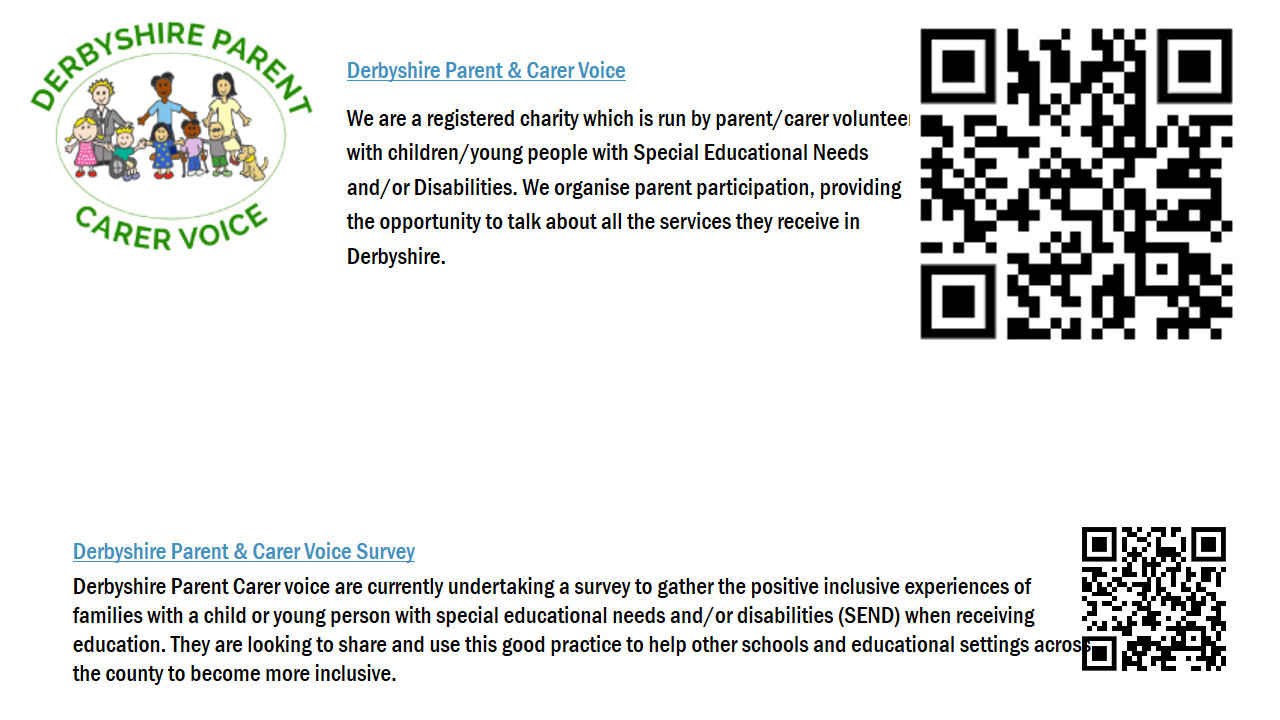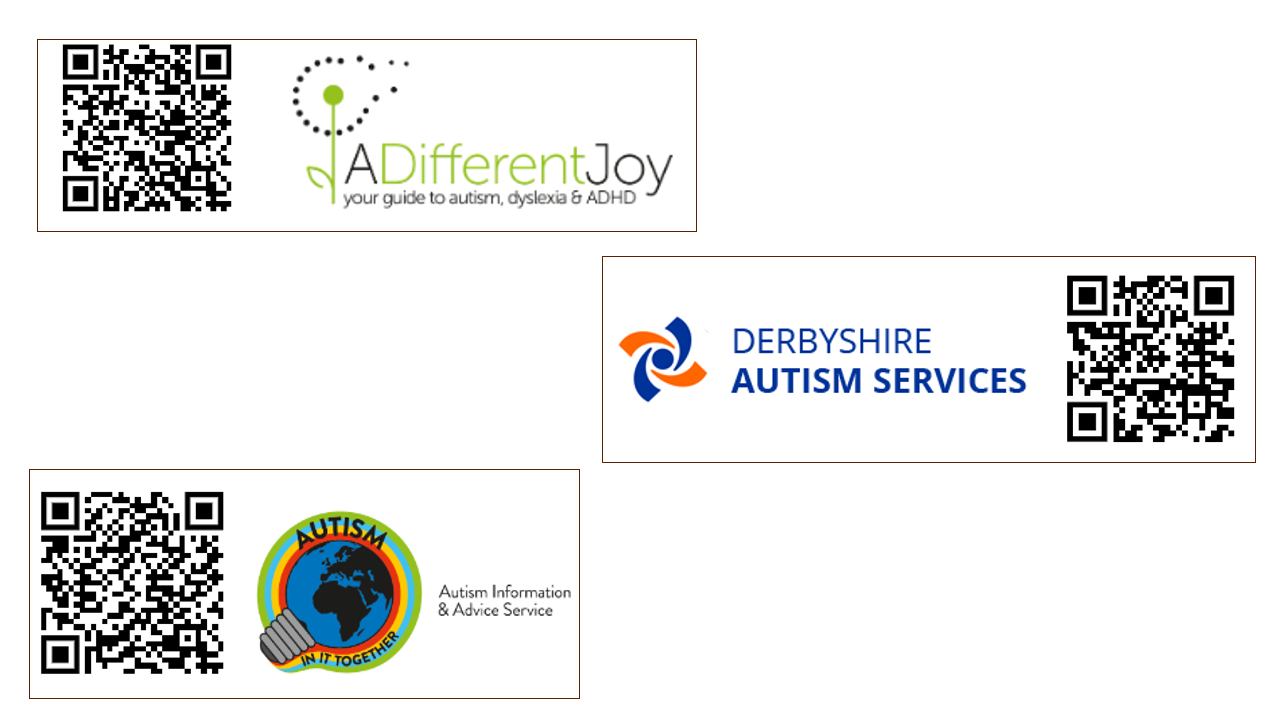SEND
At Temple Normanton Junior Academy we are committed to providing high quality learning and teaching, enabling everyone to reach their full potential, whatever their age, ability, gender or ethnicity. We believe that every person is unique and we work together in an inclusive environment of mutual respect and consideration, valuing everyone's contribution. Through our partnership with the local and wider community we aim to support our young people in successfully taking their place in society. The Special Educational Needs Co-ordinator (SENCO) here at Temple Normanton Academy is Katherine Fairest. As SENCO she co-ordinates all the specific provision that is put in place to support children with SEND.
Contacts
Temple Normanton SENDCO: Katherine Fairest - k.fairest@normanton.derbyshire.sch.uk
ACET SENDCO: Cheryl Barquero - cheryl.barquero@astonacademy.org
Temple Normanton Junior Academy Principal : Leica Carter
SEND Governor: Lauren Tann – info@normanton.derbyshire.sch.uk
ACET CEO: Rebecca Scutt BSc (Hons) PGCE
How does the Academy identify children who may have special needs?
The SEN Code of Practice defines SEN as: -
A child or young person has SEN if they have a learning difficulty or disability which calls for special educational provision to be made for him or her.
A child of compulsory school age or a young person has a learning difficulty or disability if he or she:
- has a significantly greater difficulty in learning than the majority of others of the same age, or
- has a disability which prevents or hinders him or her from making use of facilities of a kind generally provided for others of the same age in mainstream schools or mainstream post-16 institutions.
If a pupil is identified as having SEND, the academy will make provision that is ‘additional to or different from’ a differentiated curriculum intended to overcome the barrier to their learning. There are four broad areas of need which are;
- Cognition and Learning
- Communication and Interaction
- Social, Emotional and Mental Health
- Physical and/or Sensory
If you are concerned that your child may have special educational needs you should contact Katherine Fairest – SENDCO or Cheryl Barquero – ACET SENDCO
How does the Academy assess children with SEND?
A child may be identified as having SEND when he or she has significantly greater differences in learning to the majority of children the same age, or when a child has a disability (medical, emotional or behavioural) which hinders or prevents learning. A child may be identified as having Special Educational Needs, when concern has been expressed by the teacher, parent or other professional. There must be evidence for the concern. Once the child has been identified, we aim to help pupils with SEND to achieve their full potential by using a Graduated Response.
Pupils are identified as being in need of extra provision in a variety of ways:
Monitoring of a child’s progress and attainment
From the Foundation Stage to Year 6 the children’s progress is monitored through teacher assessment, termly tests and pupil progress meetings. Pupil Progress meetings are held each term; this is a meeting where the class teacher discusses the progress of each child in their class with the head teacher. This shared discussion highlights any child who is ‘falling behind’ their peers or age related expectations, for whatever reason, and an appropriate pathway is planned, be it extra support within class, or more focused interventions. On entry all children are baselined and have speech assessments to ensure needs are identified at the earliest stage.
Class Teacher Request
Staff who have concerns regarding a student may pass concerns on to the Inclusion Manger/SENDCO.
Parental Request
Parental requests can be made at any time by phone, email or letter to the SENDCO
What support is available for children with SEND; with and without an EHC Plan?
Each pupil’s education programme will be planned by the class teacher and will be underpinned by the following information.
- The teacher has the highest possible expectations for your child and all pupils in their class and meets all children needs in the first instance through wave 1 quality first teaching.
- All teaching is built on what your child already knows, can do and can understand.
- Different ways of teaching are in place, so that your child is fully involved in learning in class. This may involve things like using more practical learning.
- Specific strategies (which may be suggested by the SENDCo) are in place to support your child to learn.
- Your child's teacher will have carefully checked on your child's progress and will have decided that your child has a gap or gaps in their understanding/learning and needs some extra support to help them make the best possible progress.
It may also include Intervention which may be:
- Run in the classroom or a group room
- Run by a teacher or a teaching assistant (TA).
If a pupil has needs are related to more specific areas of their education they will receive extra support via an appropriate wave 2 intervention - which may be carried out individually or in a group. The school staff are continuingly updating their training in a variety of interventions, and are always on the ‘look out’ for new initiatives to support the children with Special Educational Needs at Temple Normanton Junior Academy. The length of interventions will vary but their success will be measured at least termly through an evaluation of set SMART targets.
Who are the other people providing services to meet the needs of children with SEND and support their families?
In order to meet the individual needs of a child, the school will work with and seek advice from a wide range of external support agencies. Parental permission is always gained prior to other professionals becoming involved in the education of their child. The school works closely with other agencies and regards them, as being part of a working relationship, whose aim is to provide integrated, high quality, holistic support focusing on the need of the individual. The following services/ agencies are currently available or involved with the school:
- Educational Psychologist
- Hearing Impaired support services
- Visually Impaired support service
- Behaviour Support Service
- Speech and Language
- Educational Welfare Service
- Social Services
- MAT
- Child and Adolescent Mental Health Service
- Occupational Therapy
- Derbyshire Information, Advice and Support Service
How are the teachers in the Academy helped to work with children with SEND and what training can they have?
All teachers have high expectations of pupils with SEND, including a commitment to ensuring they can achieve their full educational potential.
All teachers deliver high quality provision to meet the needs of children and young people with SEND.
Teachers are responsible and accountable for the progress and development of the pupils in their class, including where pupils access support from teaching assistants or specialist staff.
All staff to develop their awareness of special educational needs and focus on inclusive practice to remove barriers to learning with access to a broad, balanced yet relevant mainstream curriculum which is differentiated to ensure continuing progress .
The academy provides training and support to enable all staff to improve the teaching and learning of children, including those with SEND. This includes whole school training on SEND issues, such as Autism Spectrum Disorder (ASD) and Social, Emotional and Mental Health difficulties (SEMH).
What arrangements are in place for consulting parents/carers of children with SEND?
Positive involvement with parents/carers is seen as an important part of our work with pupils. At its most effective the education of young people is a collaborative enterprise involving teachers, parents/carers and the pupils themselves.
As a school, we review SEND provision at least three times a year by communicating directly or indirectly with parents/carers by means of:
- Attendance at parents/carers evenings
- Review meetings- including statutory , non-statutory and multi-agency reviews
- Telephone calls
- Parents/carers consultation evenings
- Parental request for a meeting
- Pupil planners
All expressions of concern will trigger a further investigation of the pupils' needs. Parents/carers will be informed of the outcome and invited to contribute and make comment. When changes are agreed to SEND status, parents/carers will be informed in writing. The Academy will inform parents/carers and children about the LA's information, advice and support service.
How will you support my child to have their views heard?
Positive involvement with pupils is seen as an important part of our work. At its most effective the education of young people is a collaborative enterprise involving teacher, parents/carers and the pupils themselves. We consult with and involve children in planning support for their education as part of the SEND review process.
What are the school’s arrangements for supporting children with SEND in transferring between phases of education?
The transition points that occur throughout a child’s academic life can often prove unsettling. To ensure these key transitions are made as smooth and stress free as possibly, we proactively plan and share information between all agencies involved, with active consent from both the child and their parents/carers.
These include:
- Consultations with parents/carers in how we can best meet the emotional needs of the child.
- Consultation with teaching staff, support staff and other lead professionals as to how we can best support the academic, medical and social needs of the child.
- Opportunities for the child and parent to have supported visits to the new situation.
- The Academy will inform the designated person for any child looked after by a local authority if a change of school takes place.
How are adaptions made to the curriculum and the learning environment of children with SEND including access?
All pupils at Temple Normanton Junior Academy have a right to participate in a broad, balanced and relevant mainstream curriculum appropriate to their needs. Strategies include; setting within the curriculum enhanced staffing, specialist provision and equipment within the Academy, including the commissioned services of Educational Psychologist, Education Welfare Officer and other specialist bodies as required. SATs access arrangements are reviewed and implemented as required.
The Local Governing Body remains committed to improving provision for pupils and adults who find access to and movement around the site difficult. The SENDCO works closely with appropriate agencies to service the best interests of the pupils, for example, the Hearing Impaired Service and the Visually Impaired Service, which assist by providing specialist equipment and training for our pupils as and when required. They monitor the progress of pupils with impairments through the school.
How is the effectiveness of children with SEND Evaluated?
Monitoring progress is an integral part of teaching and learning within Temple Normanton Junior Academy. Parents/carers, pupils and staff are involved in reviewing the impact of support for students with SEND.
Following the 'assess, plan, do, review' model, we ensure that parents/carers and pupils are involved in each step. In order to determine the effectiveness of provision, a baseline assessment is recorded at the start of intervention and a target level is set, based on expectations of how the support should impact on progress. Regular assessment allows the effectiveness of provision to be measured against the baseline assessment.
Half-termly rigorous analysis and monitoring of data allows for timely review and amendment of SEND support. Parents/carers, pupils, and academy staff, including the SENDCO, regularly contribute to the evaluation of this support and its effectiveness.
What support is available for improving emotional and social development of pupils with SEND?
School staff work with specialists to improve the emotional and social development of pupils. The school council works to ensure that pupils are listened to and any concerns regarding bullying are effectively dealt with. Academy staff have completed training courses in understanding Children’s mental health.
What are the arrangements for handling complaints for children with SEN?
The local governing body will make efforts to ensure that anyone who wishes to make a complaint including a complaint in relation to children with SEND, whether they have Education and Health and Care (EHC) plans or not, is treated fairly, given the chance to state their case, provided with a written response, and informed of their appeal rights.
Any parent/carer who wishes to discuss or make observations about the Special Needs provision for their child at Temple Normanton Junior Academy should:
- Telephone or make an informal appointment to see the SENDCO who will review the situation and arrange for it to be discussed within 5 working days of the complaint being made.
- If the parent remains dissatisfied, the complaint should be submitted formally in writing to the Principal, who will investigate the complaint and arrange a discussion within 5 working days.
Parents/carers have the right to complain:
If a concern cannot be resolved within school, any complaints should be made in writing and sent to the Chair of Governors (Mr Stephen Wright).
Where can I or my child get further help, information and support?

Derbyshire's Local Offer includes leisure and activity providers, health and care services, education providers and support groups. The Local Offer simply aims to pull information about available services into one place and make it clear and accessible for you and your family.
Alternatively, if you feel these issues need to be discussed with the Principal, Mrs Leica Carter, then again, an appointment can be arranged by contacting the school office on 01246 850389. As part of our open door policy, parents can talk to school at any time about any activities that happen at school. We hope you feel that we are inclusive and welcome your feedback and future involvement in the review of our offer.
Please contact any of the following;
Temple Normanton SENCO: Katherine Fairest k.fairest@normanton.derbyshire.sch.uk
ACET SENCO: Cheryl Barquero cheryl.barquero@astonacademy.org
ACET CEO: Rebecca Scutt BSc (Hons) PGCE rebecca.scutt@astoncetrust.org




